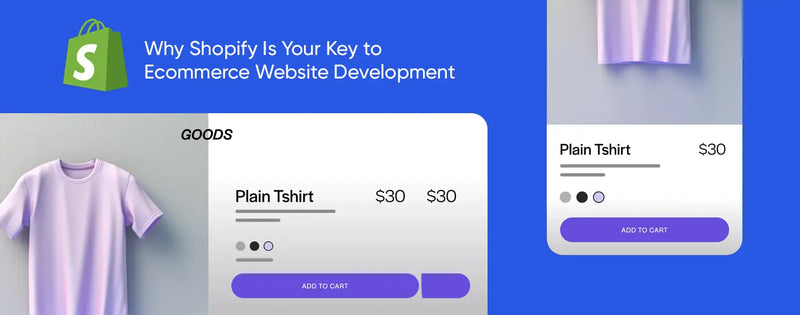Table of Contents
A successful business requires the selection of the perfect Ecommerce platform. Shopify together with its advanced version represent the market's two leading options though they serve separate market segments. The former serves startups together with small and medium businesses but Shopify Plus caters to companies that are growing rapidly along with enterprises.
This extensive analysis explores the price structures, functionality, growth capabilities and customization features to resolve the dilemma between Shopify plus vs Shopify. The guidelines presented in this article will assist you to select the right solution whether you need to start a fresh store or grow an existing one.
What is The Difference in Shopify and Shopify Plus?
Shopify Plus vs Shopify debate goes beyond the basic purpose that they serve. Because both are hosted ecommerce platforms that allow you to create a beautiful store to sell online. As the leading global commerce company, Shopify currently powers over 1 million ecommerce businesses after being founded in 2006. Its enterprise-level offering for high-volume merchants is called Shopify Plus, which launched in 2014.

Shopify Overview
It is an easy-to-use platform for startups, small businesses, and medium-sized enterprises. With pricing between $39 and $399 a month, it has everything you require to set up, operate, and expand an internet store. Some of its features include customizable themes, a drag-and-drop interface, and support for thousands of applications. This platform is ideal for companies with less than $1 million in annual revenues or those experimenting with the waters of ecommerce.
Shopify Plus Overview
It is built for scaling businesses and big businesses with sophisticated requirements. At $2,300 monthly, it offers advanced capabilities such as custom checkouts, automation solutions, and priority support. It is designed specifically for brands generating $1 million or more in annual sales, with scalability for high volumes of traffic and sales. It's used by international brand leaders such as Daniel Wellington and Gymshark.
Shopify vs. Shopify Plus Detailed Comparison
1. Pricing and Cost Considerations
Pricing is often the first consideration when choosing between Shopify Plus vs Shopify. Understanding the costs and hidden expenses helps you evaluate which plan aligns with your budget and goals.
Shopify Pricing
- Basic ($39/month): Includes essential features, 2 staff accounts, and a 2% transaction fee (waived if you use Shopify Payments).
- Intermediate ($105/month): Includes 5 staff accounts, advanced reports and 1 percent transaction fees).
- Advanced ($399/month): Has 15 staff accounts, custom reports, and 0.6% transaction fees.
Extra expenses are paid themes ($100-$500), apps ($5-$100/month each), and third-party payment gateway charges (e.g., 2% more without Shopify Payments). These can be a drain on small businesses, particularly if using multiple apps.
Shopify Plus Pricing
The price for adopting this platform begins at $2,300/month for basic implementations, with custom pricing for intricate requirements (up to $2,500+/month). Transaction fees are lower (0.15%-0.3%), and Shopify Payments can even cut them out entirely. It comes with advanced features such as Shopify Flow and priority support, minimizing the necessity for expensive apps.
Hidden Costs and ROI
Both platforms require budgeting for apps, themes, and development. Shopify’s app dependency can inflate costs for advanced functionality, while Shopify Plus’s built-in tools minimize this.
For example, Shopify Plus’s automation can save hours of manual work, potentially offsetting its higher price. A cost-benefit analysis shows it delivers better ROI for businesses with $1M+ in revenue, as lower fees and efficiency drive savings. Small businesses, however, may find Shopify’s lower entry cost more manageable.
2. Scalability and Performance
Scalability ensures growth without limitations. Shopify handles thousands of orders daily, ideal for SMEs but may struggle during traffic spikes (e.g., Black Friday). Shopify Plus manages millions of orders and surges, supporting up to 25 headless storefronts and a unified admin for multiple stores.
For global selling, the former features standard multi-currency, and the latter provides native multi-currency, world tax compliance, and localized checkout. Shopify fits steady businesses; while the latter facilitates fast, world-wide growth with reliability for big-volume brands.
3. Customization and Design Flexibility
Customization shapes your store’s functionality. Shopify’s 100+ responsive themes (free or $100-$500) and drag-and-drop editor are beginner-friendly, but advanced changes need apps or coding.
Shopify Plus enables API-driven customization, Shopify Scripts, and headless commerce, requiring developers. Shopify's themes are limited; Shopify Plus's flexibility is suitable for one-of-a-kind designs but necessitates expertise. Shopify is perfect for users without a tech background; but the latter equips businesses with custom solutions, providing a fitting customer experience.
4. SEO and Blogging Capabilities
SEO and blogging drive organic traffic, but both platforms have limitations. Shopify’s SEO tools (meta tags, sitemaps) and blogging are basic, with suboptimal URL structures (/blogs/news) compared to WordPress. Apps like Yoast SEO add costs. Its advanced version shares these constraints but integrates better with apps like Magefan or Bloggle.
Blogging boosts SEO by targeting keywords, but Shopify’s weaknesses require third-party solutions. Businesses prioritizing content may use hybrid setups (e.g., WordPress for blogging). Shopify Plus’s flexibility aids content strategies, but both need extra effort for SEO.
5. Support and Community
Reliable support ensures smooth operations. Shopify offers 24/7 support via phone, chat, and email, additionally Shopify Experts and Community forums. Shopify Plus includes dedicated account managers, priority support, and the Merchant Success Program for strategic guidance.
The Shopify Plus Partner Program connects users with vetted agencies. Shopify’s support suits SMEs; Plus’s personalized assistance is ideal for enterprises. Shared resources benefit all users, fostering collaboration.
6. Migration and Transition Challenges
Migration to Shopify Plus or from another website is not done without a plan. Upgrading from one plan to a more advanced platform is a seamless process. But migrating from WooCommerce or Magento entails data migration, SEO retention, and reconfiguration of apps.
Shopify Plus’s complexity often needs agency support. Use tools like Cart2Cart and 301 redirects to maintain SEO. Test thoroughly to avoid downtime. Proper planning ensures smooth transitions for both platforms, minimizing disruptions.
Real-World Examples and Case Studies

These 9 examples highlight how businesses leverage Shopify and Shopify Plus.
Shopify Examples
- The Honey Pot: This women-led feminine care brand sells natural products. Its intuitive storefront and subscription model drive recurring revenue, with filters simplifying product selection for customers. Shopify’s ease of use supports its growth as a small business.
- Pela: Pela retails sustainable phone cases on Shopify, prioritizing sustainability through a 360 Recycling Program. Its "Make Your Own Case" option and user-generated content drive engagement, demonstrating Shopify's suitability for medium-sized D2C brands.
- Tofino Soap Company: This small Canadian brand sells natural candles and soaps. Shopify’s simple interface and app integrations help manage small-batch production and sustainable packaging, ideal for niche businesses.
- Bombas: The sock retailer’s “buy one, give one” model on Advanced plan drives traffic with a real-time donation counter. Apps for customer engagement and donations support its mid-sized D2C growth.
- Silk & Willow: This sustainable wedding décor boutique uses this platform to sell artisanal products. Its “Seconds” collection for discounted items and elegant design showcase Shopify’s flexibility for small, eco-conscious brands.
Shopify Plus Examples
- Allbirds: The footwear brand uses omnichannel capabilities, with Shopify POS in 20+ stores. Features like buy-in-store, ship-to-customer, and up to 18 POS systems per store enhance conversions and inventory management.
- Gymshark: The fitness apparel giant leverages scalability for traffic spikes and its wholesale channel for B2B partnerships. Shopify Flow automates inventory, supporting global operations.
- Kylie Cosmetics: Kylie Jenner’s beauty brand uses headless commerce for a custom frontend and advanced analytics for influencer-driven launches, handling high-traffic product drops.
- Aje: This Australian fashion brand migrated to Shopify Plus, achieving a 135% conversion rate increase. Features like customizable checkouts and multi-currency support enhanced its international sales.
Takeaways: Shopify empowers startups and SMEs with simplicity and app-driven growth; Shopify Plus drives efficiency for enterprises with scalability, automation, and advanced integrations.
Which Plan Is Right for Your Company?
- Shopify: Best for startups/SMEs with <$1M revenue, offering affordability and ease.
- Shopify Plus: Ideal for enterprises with $1M+ revenue, needing B2B, global sales, or customizations.
Decision Framework: Consider budget ($39-$399 vs. $2,300+/month), sales volume, technical expertise, and growth goals. Shopify suits smaller ventures; Shopify Plus maximizes ROI for high-volume businesses.
Shopify vs. Shopify Plus: Feature Comparison
|
Feature |
Shopify |
Shopify Plus |
|
Pricing |
Tiered plans: Basic ($39), Intermediate ($105), Advanced ($399) per month. |
Starts at $2,000+/month with custom pricing based on business needs. |
|
Transaction Fees |
2.9% + 30¢ to 2.4% + 30¢ for online credit card rates; additional fees for third-party payment gateways. |
Lower transaction fees. 0.15% per transaction for third-party payment processors, waived if using Shopify Payments. |
|
Customization |
Limited to theme editor and basic Liquid code access. |
Advanced customization with full access to Liquid code, Script Editor, and checkout.liquid for personalized checkout experiences. |
|
Checkout Customization |
Standard checkout with limited customization options. |
Fully customizable checkout using Script Editor and checkout.liquid; ability to create personalized checkout experiences. |
|
Staff Accounts |
Up to 15 staff accounts depending on the plan. |
Unlimited staff accounts with advanced permission settings. |
|
Automation Tools |
Basic automation through third-party apps. |
Advanced automation with Shopify Flow and Launchpad for scheduling sales, automating tasks, and managing campaigns. |
|
Multi-Store Management |
Single-store management per account. |
Manage up to 10 stores from a single dashboard, ideal for international or multi-brand businesses. |
|
API Access & Integrations |
Access to over 8,000 apps; limited API capabilities. |
Enhanced API access for custom integrations with ERP, CRM, and other systems; ability to build private apps. |
|
B2B & Wholesale Features |
Requires third-party apps for B2B functionality. |
Built-in wholesale channel with customizable pricing, payment terms, and customer-specific catalogs. |
|
Support |
24/7 support via chat, email, and phone. |
Dedicated Merchant Success Manager and priority support with personalized assistance. |
|
Analytics & Reporting |
Standard reports and dashboards. |
Advanced analytics with ShopifyQL Notebooks for custom reporting and deeper insights. |
|
Security & Compliance |
PCI DSS compliant with standard SSL certificates. |
Enhanced security features, including custom SSL certificates and advanced compliance tools. |
|
Internationalization |
Basic multi-currency and language support; limited to 3 default markets. |
Robust multi-channel selling with support for multiple currencies, languages, and marketplaces; advanced features for global expansion. |
|
Theme Storage |
Store up to 20 themes. |
Store up to 100 themes, allowing for seasonal or campaign-specific designs. |
Partner with ShopX to Build A Shopify Store That Actually Performs!
At ShopX, we specialize in easing your decision between ShopifyPlus vs Shopify and provide services to scale your business according to industry standards. Whether you're launching a new store or upgrading an existing one, our team delivers high-performance eCommerce platforms that drive results.
Our services include UI/UX design, custom app development, sales funnel optimization, and advanced discounting logic. We've helped clients like Just Thrive achieve a 56% increase in conversions and a 14% boost in total sales. With expertise in technologies like Shopify OS 2.0, Liquid, and NodeJS, we ensure your store is both robust and scalable. Partner with ShopX to elevate your online presence and drive growth.








